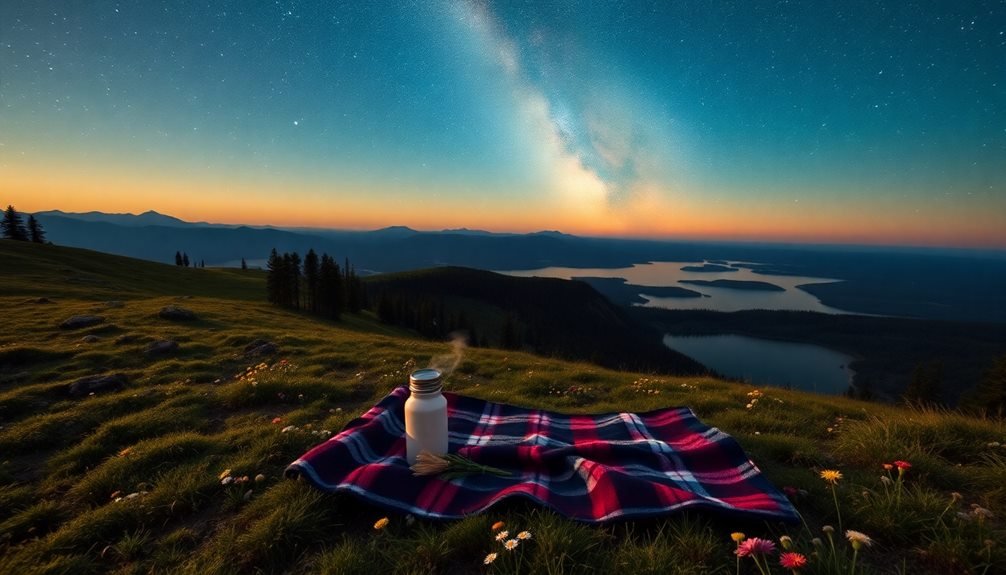For anxiety-friendly stargazing, you'll find comfort in five tranquil locations. Your private backyard or patio offers a secure, familiar setting with easy access to essentials. Hilltop state parks provide elevated views with established safety measures and ranger presence. Lake district shorelines combine open skies with calming water features and natural boundaries. Secluded community gardens create intimate spaces with controlled access and natural barriers. Rooftop observation decks deliver secure, elevated viewing with modern amenities and limited entry. Each location balances celestial wonder with peace of mind, and there's much more to discover about these anxiety-conscious viewing spots.
Private Backyards and Patios

Your private backyard or patio offers a familiar and secure environment for stargazing, especially if you're dealing with social anxiety. You'll have complete control over your surroundings, allowing you to focus on the night sky without worrying about unexpected interactions or unfamiliar spaces.
Set up your viewing area with comfortable seating that you can easily adjust. A reclining chair or padded lounger lets you observe for extended periods without neck strain. Keep essential items within arm's reach: star charts, binoculars, red flashlight, and any comfort items that help manage anxiety.
Your home's proximity means you can quickly retreat indoors if weather changes or anxiety increases. Consider installing dimmable outdoor lighting with red bulbs to maintain night vision while providing a sense of security.
Position yourself away from direct street lights and use existing structures or plants to block light pollution.
If noise triggers anxiety, schedule your viewing sessions during quieter hours. You might find that weeknight stargazing offers more peaceful conditions than weekends.
Remember to inform household members about your planned observation time to avoid unexpected interruptions that could disturb your stargazing experience.
Hilltop State Parks
State parks situated on hilltops serve as elevated sanctuaries for anxious stargazers seeking both open skies and established safety measures.
You'll find well-maintained trails, designated parking areas, and often park rangers patrolling until closing time. Many hilltop state parks offer dedicated stargazing platforms or observation decks with safety railings, allowing you to focus on the cosmos without worrying about your footing.
These locations typically maintain set hours and gate systems, which can help ease concerns about unexpected visitors. You'll want to check the park's website for specific night sky viewing policies, as many offer extended hours during meteor showers or celestial events.
Most hilltop state parks provide clean restroom facilities and emergency phones, adding another layer of security to your stargazing experience.
Consider bringing a folding chair that's easy to carry up marked paths, and don't forget to download the park's trail map to your phone.
You can usually find other astronomy enthusiasts at these locations, creating an informal community that helps reduce isolation anxiety while maintaining comfortable personal space.
The elevation at these parks also means you're above much of the ground-level light pollution, offering clearer views of the night sky.
Lake District Shorelines

The calm waters of lake district shorelines provide natural boundaries that can help anxious stargazers feel more grounded and secure.
You'll find that lakeside viewing spots offer both open sky visibility and comforting proximity to water, creating a perfect balance for anxiety management. The gentle lapping of waves can serve as a natural white noise, helping you stay focused on the present moment rather than racing thoughts.
When choosing your lake district stargazing spot, you'll want to scout locations during daylight hours. Look for shorelines with these anxiety-friendly features:
- Wide, sandy beaches that give you plenty of space to set up your viewing equipment without feeling hemmed in.
- Natural barriers like tree lines or gentle slopes that block light pollution from nearby towns while preventing feelings of exposure.
- Easy access to your vehicle or shelter, ensuring you won't feel trapped if weather changes or anxiety increases.
You'll also benefit from the lake's natural cooling effect, which often creates clearer viewing conditions than inland locations.
The moisture-rich air tends to settle, reducing atmospheric turbulence that might otherwise distort your view of the stars.
Secluded Community Gardens
Hidden within urban neighborhoods, secluded community gardens offer anxious stargazers an intimate setting that combines the security of enclosed spaces with unobstructed views of the night sky.
You'll find these gardens provide natural barriers like hedges and fences that create a sense of privacy while maintaining good sight lines to celestial objects.
Most community gardens feature raised beds and wide pathways that double as perfect spots for setting up telescopes or laying out blankets.
You won't need to worry about unexpected visitors, as these spaces typically require membership or scheduled access.
The familiar surroundings and controlled environment can help ease social anxiety while you're focusing on the stars.
Look for gardens that provide seating areas or bring your own portable chair.
You'll want to check the garden's rules about nighttime access, as many maintain specific hours for members.
Some gardens even organize stargazing events where you can connect with fellow astronomy enthusiasts in a structured, low-pressure setting.
During winter months, you'll appreciate how garden walls and structures block harsh winds while still allowing clear views of constellations.
Rooftop Observation Decks

Elevated above city streets, rooftop observation decks provide anxious stargazers with controlled environments that feel both secure and spacious.
You'll find these dedicated viewing areas offer reliable safety features like sturdy railings and well-lit pathways, making them ideal for those who experience height-related anxiety. Many buildings now incorporate comfortable seating areas and protective windscreens to create a more sheltered stargazing experience.
When choosing a rooftop deck for your celestial observations, you'll want to take into account these essential features:
- Limited-access entry systems that prevent overcrowding and maintain a calm atmosphere
- Clear sightlines to specific constellations, with minimal light pollution from surrounding buildings
- Weather protection elements like retractable canopies that don't obstruct your view of the night sky
You don't need to worry about terrain challenges or unexpected wildlife encounters that often come with remote viewing locations.
Instead, you'll have easy access to amenities like restrooms and temperature-controlled indoor spaces. Most urban rooftop decks also offer the convenience of nearby parking and elevator access, reducing the stress of transportation and mobility concerns.
Frequently Asked Questions
What Astronomy Apps Help Identify Constellations for Anxiety-Prone Beginners?
You'll find SkyView Lite and Star Walk 2 perfect for learning constellations at your own pace. These user-friendly apps let you simply point your phone at the sky to identify stars and planets.
How Can I Reduce Light Sensitivity While Stargazing Without Triggering Panic Attacks?
You'll adjust better to darkness by using a red flashlight and dimming your phone's screen. Start with short viewing sessions, and don't force yourself to look up continuously. Take slow breaths between observations.
Which Telescopes Are Most Stable for People With Shaky Hands?
You'll find Dobsonian telescopes ideal for shaky hands since they're heavy, sturdy, and stay put once positioned. Consider computerized mounts too – they'll track objects automatically while keeping your scope stable during viewing.
Are There Local Stargazing Groups Specifically for People With Social Anxiety?
You'll find anxiety-friendly astronomy clubs through Facebook groups, meetup.com, or your local planetarium. Look for "quiet stargazing" or "small group viewing" events, where you can join others at your own comfort level.
What Meditation Techniques Work Best During Meteor Shower Watching Sessions?
Try focused breathing while you're watching meteors – inhale for four counts, hold for four, exhale for four. You can also practice body scanning or use mantras to stay present and grounded.
In Summary
You'll find peace in these five locations away from city lights and crowds, making stargazing less stressful for those who prefer solitude. Whether you're lounging in your backyard, hiking up to a hilltop overlook, or settling in at a quiet lakeshore, you can enjoy the cosmos at your own pace. Don't forget to bring comfort items like blankets and calming music to make your stargazing experience even more relaxing.





Leave a Reply